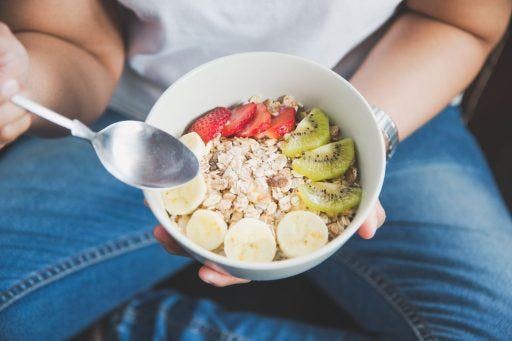The Food & Mood Centre at Deakin University defines the gut microbiome as “the trillions of [microbiota] and their genetic material that live in your intestinal tract.” And according to The Nutrition Source (TNS) by Harvard T.H. Chan School of Public Health, “Each person has an entirely unique network of microbiota that is originally determined by one’s DNA.”
As you grow, the diet you consume, the environment you live in, and your eating habits can impact this complex ecosystem, changing it for better or worse. Depending on how balanced the microbiota in your microbiome is, they can be either helpful or harmful to your body’s processes.
As TNS explains, “In a healthy body, pathogenic and symbiotic microbiota coexist without problems.” Dysbiosis occurs when there are disturbances in the bacterial balance due to various factors, including illness, dietary choices, and medications. When your microbiome is out of sync, you become more vulnerable to inflammation, disease, and other complications.
Over the years, it’s become clear how important a balanced microbiome (or a “healthy gut”) is to overall well-being. Researchers are investigating how it relates to everything from mental wellness and immunity to oral health. So, yes, your gut microbiome affects your mouth, too. Here’s how!
The Oral-Gut Connection

In an article for RDH (Registered Dental Hygienists) Magazine, dental hygienist Carrie McHill explains that oral pathogens can disrupt the gut’s functions and vice versa. She emphasises that “one of the contributing factors to periodontal disease lies in the health of bacteria in the gut.”
When bacteria invade gum pockets in the mouth, they can travel through the body via the epithelial lining, leading to systemic inflammation. And when the same bacteria reach the gut, they can exacerbate inflammation further.
According to McHill, “By affecting the gut, oral pathogens thus affect all the functions the gut carries out.” That means your body’s defences against additional oral health threats become less effective, too. In other words, it creates an endless cycle of disease and inflammation.
On the flip side, “The oral environment is likewise affected by the dysbiosis of the gut microbiome. The overgrowth of harmful bacteria can contribute to oral health issues.” She points to oral dysfunctions like tongue swelling, lesions, and inflamed gums as indicators and side effects of poor gut health.
5 Practical Tips for a Balanced Gut Microbiome

Don’t let all the complicated scientific jargon overwhelm you! Taking care of your gut and the network of bacteria within it can be simple. Here are a few things you can do today to balance your microbiome.
1. Eat a high-fibre diet.
Some types of dietary fibre can act as prebiotics, helping nurture the beneficial bacteria in the gut. These prebiotic fibres include ingredients like garlic, onions, and chickpeas. Additionally, a high-fibre diet can improve digestion and the absorption of nutrients. Aim to have portions of vegetables and whole grains (i.e., oats and brown rice) in every meal to ensure you’re getting your fill of fibre.
2. Focus on diverse and whole foods.
Consuming a wide variety of whole foods (like fruits, vegetables, and grains) can promote microbial diversity, which helps keep your microbiome in tip-top shape. Whole foods also tend to be nutritionally dense and rich in fibre. On the other hand, highly processed foods (like sugary snacks and refined grains) offer fewer essential nutrients and more inflammatory additives like unhealthy fats.
3. Learn to love probiotics.
Probiotics are live microorganisms that help balance the “good” and “bad” bacteria in the gut. Certain probiotics also aid in the digestion of carbs, protein, and fat. Fermented foods like yoghurt, sauerkraut, and kimchi are a few widely accessible probiotic sources and are easy to integrate into most meals. You can also take probiotic supplements as an additional measure.
4. Take antibiotics only when advised by your doctor.
Antibiotics treat bacterial infections by killing or inhibiting the growth of bacteria. Unfortunately, these medications can’t always distinguish between harmful and beneficial bacteria, so they tend to affect both. As a result, your microbiome can become unbalanced. That’s why you should only take antibiotics when prescribed by a doctor, keeping intake to the recommended duration.
5. Maintain good oral hygiene.
As McHill explores in RDH Magazine, whatever happens in the mouth has the potential to impact the gut. While keeping up with your oral hygiene routine will always be the right call, its positive effects on gut health are a bonus. So, brush and floss regularly to banish disease-causing bacteria, and undergo regular dental checkups to catch any issues before they worsen.
If you have crooked teeth, consider investing in teeth-straightening solutions like ClearCorrect aligners to improve the cleaning process. How does that work? Many dental experts believe well-aligned dentition is easier to care for since you’re less likely to miss hard-to-reach areas when brushing or flossing. And during treatment, you can easily pop them off when it’s time to clean. Convenient, yes?
The gut microbiome is so integral to bodily functions that many researchers consider it an organ. Neglecting it spells trouble for your overall health. So, tend to it as best you can! Not only will it be good for your gut, but it’ll also be good for your teeth and everything else.
References:
Department of Health & Human Services. (n.d.-c). Gut health. Better Health Channel.
Harvard Health. (2020, August 24). How to get more probiotics.
McHill, C. M. (2021, July 21). Gut health: A key link between oral and systemic wellness. RDH Magazine. Retrieved June 21, 2023, from
The Microbiome. (2022, July 25). The Nutrition Source.
What is the Gut Microbiome? (2021, December 13). Food and Mood Centre.



